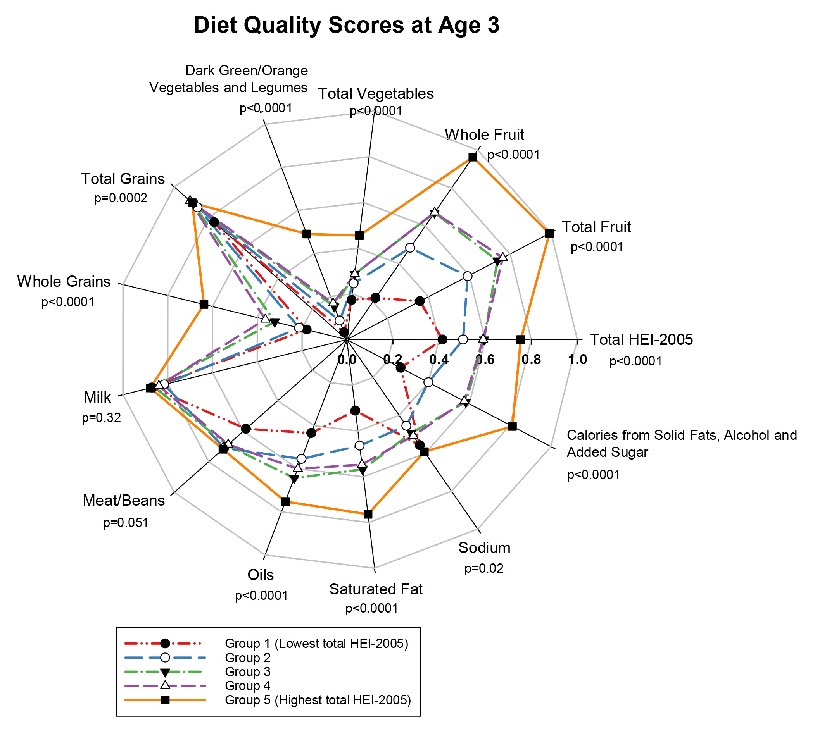Diet Quality Trajectories in Early Childhood Reveal Targets for Improvement
Research By: Jessica Woo, MHSA, PhD,
Post Date: October 30, 2020 | Publish Date: Oct. 24, 2020

Kids and food—the relationship between them is always evolving. In their early years, a child’s diet may go through phases of growth and change, while remaining much the same at others. What can we learn from these patterns?
By exploring diet quality trajectories in young children, researchers at Cincinnati Children’s are gaining new insights on key periods for the development of healthy dietary patterns. Their findings, published October 24, 2020, in the Journal of the Academy of Nutrition and Dietetics, identify opportunities for early intervention that could lead to long-term benefits.
The quality of a child’s early diet—defined by intake of adequate nutrients and avoidance of energy-dense, nutrient-poor foods—can have a lasting effect on dietary habits. As children develop critical patterns in diet selection, these habits are often carried forward into later life.
How can we ensure that children form good habits early on? The better we understand how these patterns are established, the better we can target our approach to nutrition interventions. However, significant research gaps have left us with little data on how diet quality changes during early childhood.
To close these gaps, the research team developed a unique approach—leveraging a rich dataset from a previous study focused on body mass index (BMI) rebound. Study participants included 372 healthy, three-year-old non-Hispanic African American and white children. Over the next four years, participants were evaluated during 13 face-to-face visits. At each visit, parents provided a three-day diet record, noting specifics about the foods their child had eaten.
This highly detailed dataset allowed the research team to evaluate changes in dietary quality during the critical years between age three and seven. Using group-based trajectory modeling, the team identified clusters of participants following similar progressions. Five groups were identified from lowest to highest average diet quality—with each group either improving, worsening, or staying the same over time.
Next, researchers identified the factors that were driving these scores. In contrast to previous studies that often demonstrate lower diet quality in African American children, the team found that racial differences were not significant to diet trajectory.
“We anticipated that demographic variables would be the most important factors differentiating children with high vs. low overall dietary scores,” says lead author Jessica Woo, MHSA, PhD. “However, we identified that early infant and toddler feeding practices, such as breastfeeding and introduction to sugary beverages, were more important.”
Regardless of overall diet quality, most children had an adequate intake of dairy and total grains, but low intake of whole grains and vegetables. While this may seem unsurprising—what kid couldn’t stand to eat more vegetables?—these findings offer concrete evidence that can help shape the priorities of future interventions.
Based on patterns researchers found in each age group, early timing for these interventions could be crucial. When children had low diet quality at age three, this remained consistent to age seven, indicating that diet quality is difficult to change once established. For interventions to be most effective, they should begin before age three.
“Data from this study could provide guideposts for clinicians to identify families at risk for low overall diet quality, in addition to the metrics that should be the focus of education or intervention,” says Woo. “The ultimate goal is to improve all children’s diet quality early in life, reducing the risk of adverse health consequences later.”
About the study
This study was originally funded by the NIH/NHLBI (R01 HL064022). Funding for this secondary analysis was provided by Cincinnati Children’s Hospital Medical Center and the Center for Clinical and Translational Science and Training grant (5UL1TR001425-04). The sponsor did not participate in the design, analysis, interpretation or decision to publish this work.
| Original title: | Longitudinal Diet Quality Trajectories Suggest Targets for Diet Improvement in Early Childhood |
| Published in: | Journal of the Academy of Nutrition and Dietetics |
| Publish date: | Oct. 24, 2020 |
Research By







